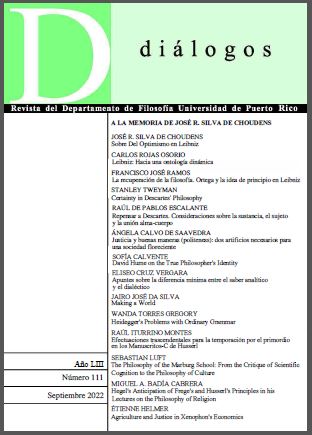Abstract
The recovery of philosophy implies acknowledging the peculiar character of philosophical experienceexposed by José Ortega y Gasset in his important and posthumous book on Gottfried Leibniz, La idea de principio en Leibniz (1958/1992). In order to show forth the lively aspect of such a millennial experience, Ortega carries out a meticulous study of the distinctive mode of thinking in Antiquity, the Middles Ages, modern epoch from Descartes to Leibniz, and leading up to twentieth century philosophy. In the same manner he delves into the scientific mode of thinking from Euclid to contemporary physics, and into decisive aspects of art, myth and poetry as well. The following text has as starting point the question about the ultimate ground of reality, and the intertwinement of the infinite multiplicity of phenomena and the integral activity of real phenomena.This paper also deals with Ortega’s elucidation of Leibniz’s work and Ortega’s diverse perspectives on the activity of philosophy in order to confirm the independence of philosophical thought from theology, science, and the arts. Finally, I suggest that The idea of principle in Leibniz may be taken as a compass to immerse oneself into the conceptual and literary richness of the great Spanish thinker.

This work is licensed under a Creative Commons Attribution-NonCommercial 4.0 International License.

